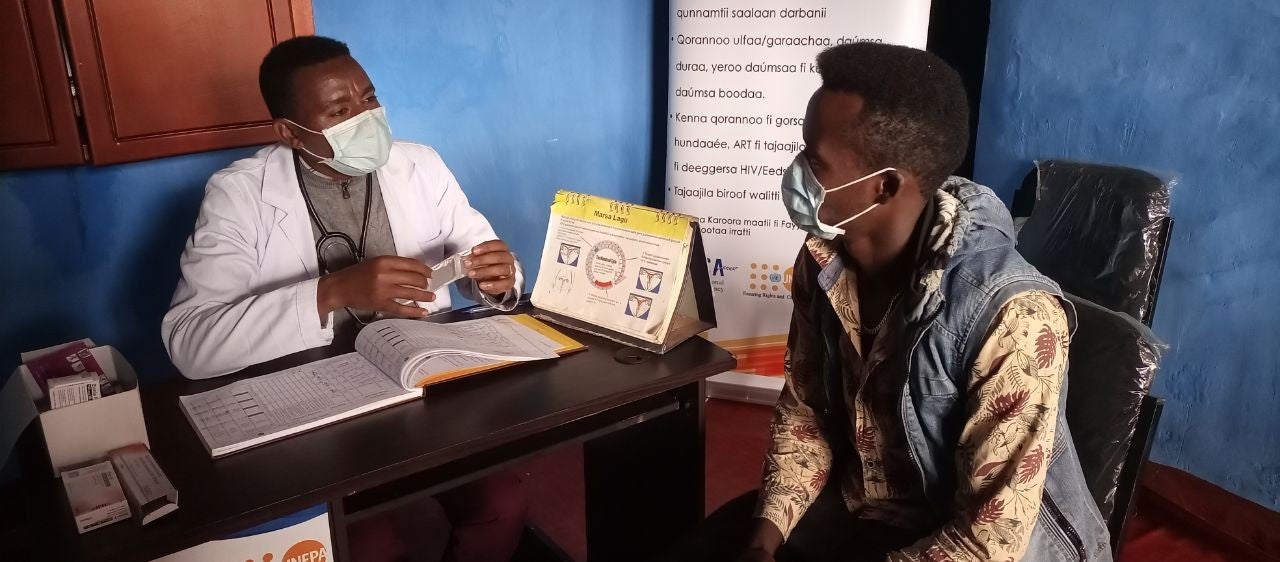Bule Hora District, ETHIOPIA: Nineteen year-old Hirut Adola is serving as a peer-to-peer educator on sexual and reproductive health and peace advocator in the Bule Hora district of the Oromia region. This is one of the six implementation districts of the UNFPA supported integrated family planning and sexual health programme funded by the Korea International Cooperation Agency (KOICA).
Hirut is currently a third-year accounting student at the Bule Hora University. She started participating in the integrated programme last year based on the information she got from one of her friends. She is among the more than 22 thousand young people trained on peer education and peace building in the past one year and half since the programme started.
“I found the free discussion on adolescents and youth SRH to be impressive as I never had such kind of experience neither with my friends nor with my family member because it was considered as a taboo,” testifies Hirut. She says the peer-to-peer education is facilitated twice a week for two hours to discuss on such issues as unintended pregnancy, family planning, sexually transmitted infections, proper and consistent use of condoms and prevention and availability of response services on gender-based violence.
A rise has been observed in the demand for and use of sexual and reproductive health services among adolescents and youth. Through the referral mechanism, peer educators like Hirut are referring adolescents and young people to the youth friendly service corner at the nearby Gerba Health Center to access SRH services. The programme is also availing access to lifesaving emergency reproductive health kits.
“Previously I and other youth were afraid of visiting health facilities to seek SRH and other service because the health centers didn’t have youth friendly services. Thanks to the programme we can now access services without any fear of stigma,” remarks Hirut.
Capacitating healthcare providers
The integrated programme which targets 100 thousand unmarried and married adolescents and youth is striving to empower these sections of the community not only by making choices and services available but also developing the capacity of healthcare providers and institutions to ensure informed choices.

Addisu Wako who is a clinical nurse at the Gerba health center benefited from the training on adolescent and youth reproductive health provided by the KOICA funded integrated programme. “Previously the health center didn’t have a youth friendly service and young client flow to seek SRH services was minimal,” he said adding that since the establishment of youth friendly service corner SRH services are being provided privately keeping confidentiality. “The center provides family planning, VCT, STI, abortion, psychosocial first aid and other SRH services,” notes Adissu.
Referral linkage
Adolescents and youth discuss about SRH issues in the waiting room. The in- and out-door games are also attracting the flow of service seeking adolescents and youth. The youth friendly service corner has referral linkage with youth centers, school clubs and other youth engagement platforms.
The integrated programme being implemented in six selected woredas in the West Guji and Gedeo Zones of the Oromia and Southern Nations, Nationalities and Peoples Regions respectively is strengthening the efforts of the government in increasing access and availability of SRH services to adolescent and youth. The programme is also bolstering efforts at strengthening key social behaviour change communication platforms to enhance service seeking behaviours.
“I will continue my support to adolescents and youth in providing education and linking them with SRH services centers,” says Hirut with enthusiasm.


